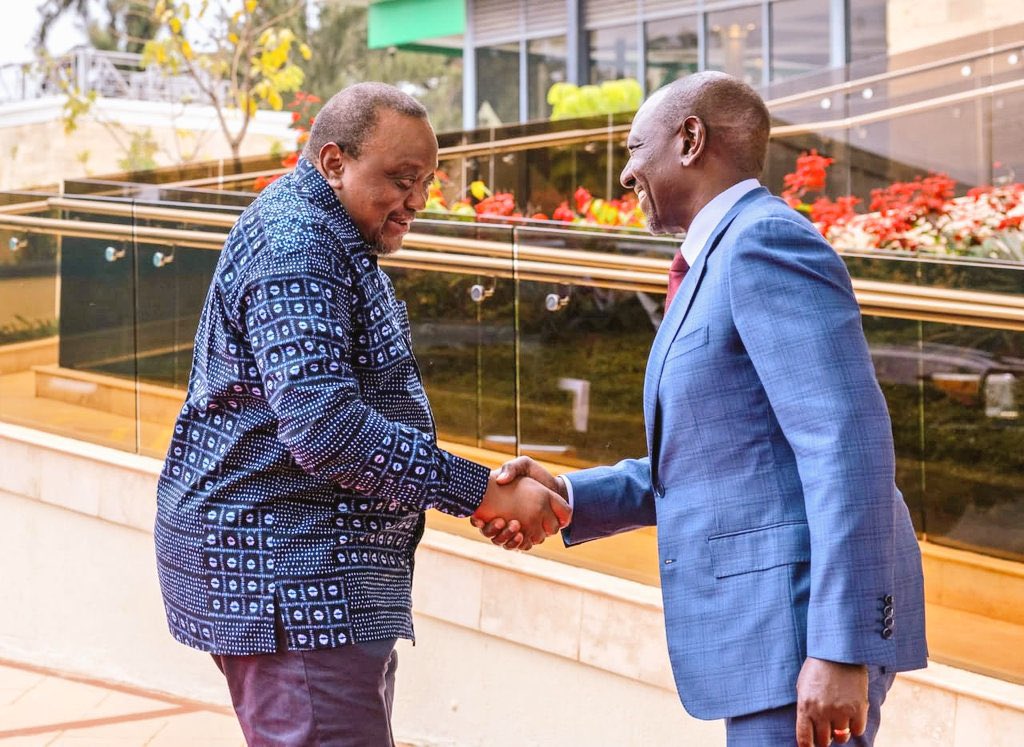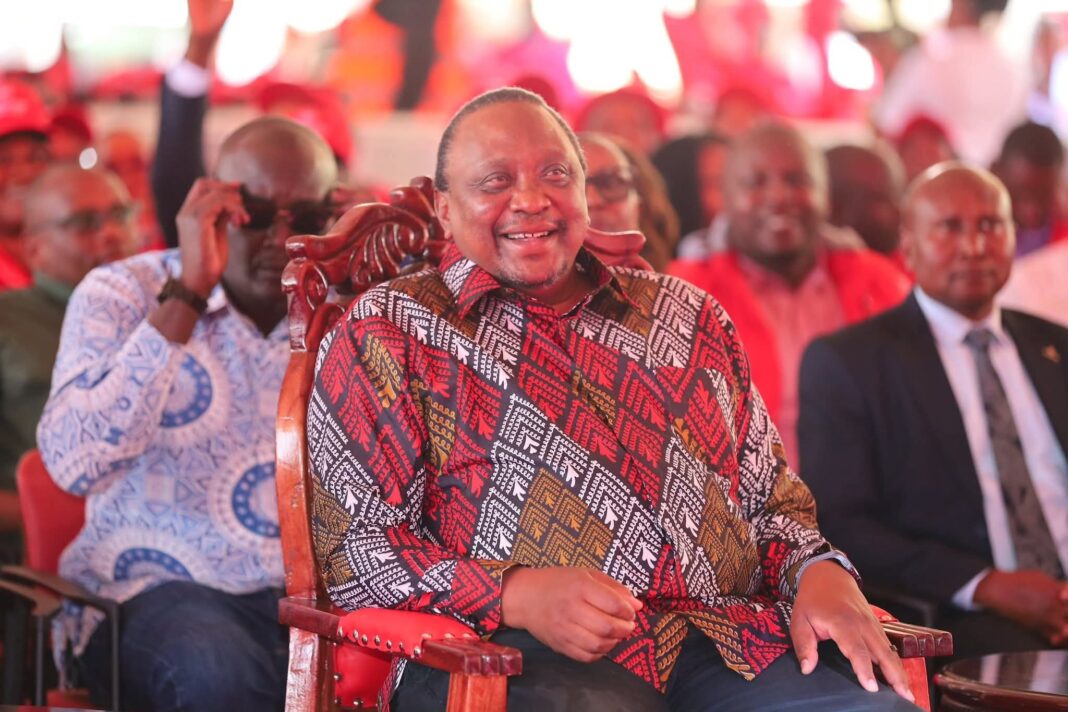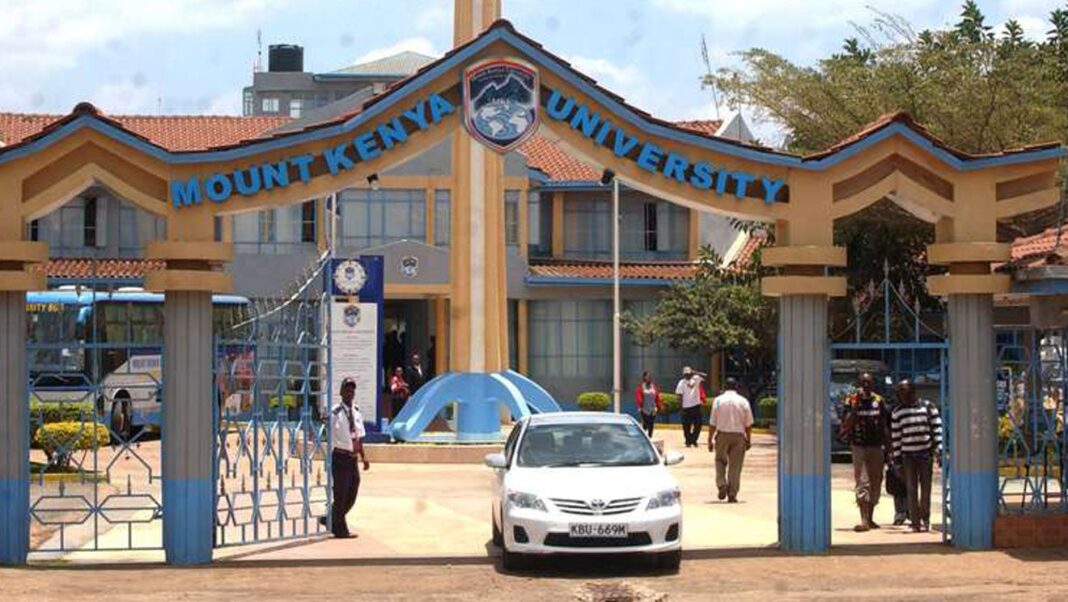Former President Uhuru Kenyatta has broken his silence on the political storm that followed the 2022 general elections. Speaking during the Jubilee Party National Delegates Conference in Nairobi, the former Head of State revealed how his family and political allies were allegedly targeted after President William Ruto’s victory.
Uhuru, who had backed opposition leader Raila Odinga in the heated contest, painted a picture of hostility, intimidation, and political vengeance that, he says, threatened to dismantle his legacy and weaken his party.

Former President Uhuru Kenyatta says his family and allies faced threats after polls
Uhuru disclosed that the weeks and months following the elections were marked by fear and tension within his camp. According to him, his family members and senior officials in his previous administration were singled out. He did not name those behind the threats but described the period as one of the darkest moments of his career.
“Three years ago, at the end of the hotly contested general elections, we faced an atmosphere of hostility not only to our party but also to me, members of my family, and members of my administration,” Uhuru said.
The former President insisted that the threats did not stop him from reorganizing his political base. He reminded delegates that he stood on the same stage in 2022 to begin the process of restructuring Jubilee, despite the hostile environment. Uhuru explained that his focus was on injecting new leadership and reviving the party to remain a force in Kenya’s political landscape.
At the same time, Uhuru urged Kenyan leaders to abandon politics of anger, bitterness, and hate. He warned that such toxic politics only delay development and destroy unity. According to him, genuine politics should reflect the collective will of the people, whether expressed within a party or through the ballot box.
Uhuru Kenyatta criticises use of security agencies against citizens
In his speech, the former President also trained his guns on the Kenya Kwanza government. He accused President Ruto’s administration of weaponizing security agencies to instill fear instead of protecting citizens.
Uhuru reminded the delegates that his government invested heavily in building modern security infrastructure. He claimed that the system he left behind was intended to protect Kenyans, not intimidate them.
“This machine that we built, however, was not designed to face its own citizens and wasn’t supposed to be a source of fear and conflict. It was to protect them, not harm them,” Uhuru declared.
His remarks come at a time when critics have accused the current administration of using police to suppress demonstrations, harass opponents, and silence dissent. Uhuru’s comments appeared to echo growing public concerns that security forces have become tools of political control rather than protectors of the people.
Allegations of political revenge cut both ways
Uhuru’s fresh claims have reignited debate on political persecution in Kenya. While he insists his family and allies were targeted after Ruto took office, critics remind him that Ruto and his camp were also victims before the elections.
During Uhuru’s second term, many Kenya Kwanza allies complained of intimidation, arrests, and harassment by state agencies. At the time, Ruto himself accused Uhuru of isolating him and punishing his supporters for standing with him.
This cycle of revenge politics, observers argue, reflects a wider problem in Kenya’s democracy. Each regime accuses the other of weaponizing institutions, a pattern that undermines trust in the state and breeds political hostility.
Political analysts warn that if the trend continues, every election will be followed by retaliation against rivals, deepening divisions rather than uniting the country. Uhuru’s words, therefore, serve not only as a reminder of his own grievances but also as a mirror of Kenya’s repeated failure to build a culture of tolerance in leadership transitions.
Healthcare reforms dismantled
The former President also criticised the government for allegedly undoing healthcare reforms that he introduced. He cited programs such as Linda Mama, which supported expectant mothers, claiming that they were scrapped and replaced by untested initiatives.
According to Uhuru, reversing such policies denies Kenyans access to essential services. He faulted the administration for, in his view, prioritising short-term political gains over the welfare of citizens.
What Uhuru’s remarks mean for Jubilee and Kenyan politics
Uhuru’s bold remarks have placed him back at the center of Kenya’s political debate. His attempt to revive Jubilee comes at a time when the party has lost influence to both Kenya Kwanza and Azimio la Umoja.
By portraying himself as a victim of post-election hostility, Uhuru is positioning his party as a voice of resilience and democratic renewal. Whether Jubilee can reclaim relevance in the country’s politics, however, remains uncertain.
What is clear is that Uhuru Kenyatta has reminded Kenyans of the deep scars left by the 2022 contest. His accusations against Ruto’s administration and his call for sober politics will continue to stir debate about how power is exercised in Kenya and how transitions are managed.


